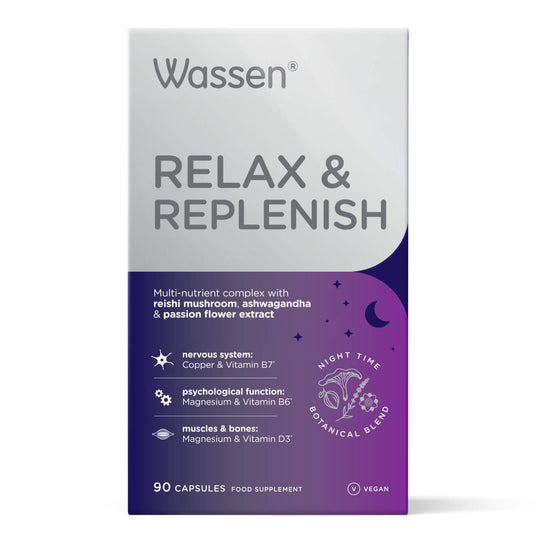As life gets busier, many of us notice stress showing up not just in our minds, but in our bodies. If you've been feeling more overwhelmed, fatigued, or tense lately, you're far from alone. Stress Awareness Week offers the perfect reminder to pause and prioritise our wellbeing - especially for women navigating midlife changes, hormonal shifts, work pressures, and caring responsibilities. If you’re ready to feel calmer, sleep better, and restore your energy, small nutrition and lifestyle choices can make a very real difference.
“Stress is inevitable, but overwhelm doesn’t have to be. By nourishing your body with the right nutrients, prioritising rest, and spending time outdoors, you can help your mind and body stay balanced”
— Victoria Malcolm, Nutritionist at Wassen
How Stress Affects the Body: The Science Behind Cortisol and Stress Symptoms
When we experience stress - whether emotional, physical, or mental - the body releases a hormone called cortisol. Cortisol plays an important role in helping us respond to challenges. However, when stress becomes ongoing, cortisol levels remain elevated, and this can have widespread effects on the body.
Common Causes of Stress
- Busy schedules and constant ‘to-do’ lists
- Hormonal changes, including perimenopause and menopause
- Work or home pressures
- Poor sleep
- Emotional or mental strain

Physical Symptoms of Stress
High or long-lasting cortisol levels can lead to:
- Fatigue or feeling “tired but wired”
- Headaches or muscle tension, especially in the shoulders and jaw
- Digestive issues or bloating
- Low mood or heightened irritability
- Difficulty switching off in the evening
- Sugar cravings
- Poor sleep quality
Over time, stress can leave us feeling emotionally overwhelmed and physically depleted - which is why actively supporting the nervous system matters.

Top Nutritionist-Recommended Ways to Reduce Stress & Support Cortisol Balance
In recognition of Stress Awareness Week (4–8 November), our Nutritionist Victoria Malcolm shares her simple, supportive ways to combat stress and nourish both body and mind.
1. Feed Your Gut, Feed Your Mood
Around 95% of serotonin - the neurotransmitter linked to ease, emotional balance, and resilience (also known as our 'happy hormone') - is made in the gut.
Beneficial gut bacteria rely on soluble fibre as their fuel source, and when you don’t get enough, your mood can suffer.
Support your gut with soluble fibre from:
- Oats
- Apples
- Beans & lentils
- Chia and flaxseed
These not only support digestive health but can also influence serotonin and GABA levels - the calming neurotransmitters that help us feel relaxed and positive.
Most people eat less than 30g of fibre per day, well below the recommended amount. Aim to gradually increase your intake with wholesome, plant-based foods to support both gut and mental wellbeing.

These Apple & Cinnamon Overnight Oats are a brilliant fibre-rich way to start the day. Check out the recipe here.
2. Move for Your Mind
Exercise is one of the most powerful natural stress relievers. It boosts serotonin, helps balance stress hormones like cortisol, and improves sleep quality.
Even gentle movement helps:
- Reduce cortisol
- Ease tension
- Support more restful sleep
“A 20-minute outdoor walk, especially in the morning, can help reset your body clock and lift your mood for the rest of the day.”
- Victoria Malcolm, Wassen Nutritionist

3. Prioritise Protein & Tryptophan
Tryptophan is an essential amino acid and the building block of our 'happy hormone', serotonin.
Support your serotonin production with these great tryptophan sources:
- Turkey
- Eggs
- Nuts
- Oats
- Bananas
Pairing these with complex carbohydrates such as brown rice or quinoa helps tryptophan cross the blood-brain barrier more effectively, enhancing its mood-boosting benefits.

4. Replenish Key Stress-Supporting Nutrients
When we’re stressed, our bodies use up more vitamins and minerals - especially Magnesium and B vitamins (B6 and B12), which are vital for energy metabolism and nervous system function.
Replenish your Magnesium and B vitamin levels naturally with:
- Leafy green vegetables
- Wholegrains
- Nuts
- Seeds
Magnesium, in particular, helps relax muscles and promote calm, while B vitamins support energy levels and resilience to stress.

5. Support Restorative, Deep Sleep
Sleep is one of the most powerful ways to reset cortisol.
Try creating a calming bedtime ritual by:
- Gentle yoga or stretching
- Keeping lights dim
- Avoiding screens for at least two hours before bed to limit blue light exposure that can interfere with melatonin production
For added night-time support, Wassen Relax & Replenish contains Magnesium, Ashwagandha, Passionflower & Reishi Mushroom to help unwind the mind and support deeper, more restorative sleep.

A Gentle Reminder
Stress is part of life - but feeling constantly overwhelmed doesn’t have to be.
Your body is capable of restoring balance, especially when given the right support, rest, and nourishment.





